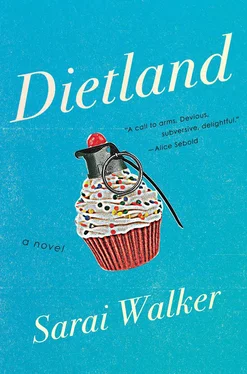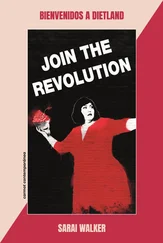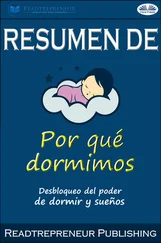The $20,000 would soon be mine. After hanging up the phone, I looked through all my catalogs and ordered more clothes.
Verena had said the process of weaning off Y—— would take more than a month. I couldn’t hide in my apartment for all that time. I decided that returning to my normal routine would offer stability and help me deal with the disorienting symptoms. I packed my laptop bag and headed to the café for the first time in weeks. On my way there I thought more about the second task. If I had wanted to confront someone I wouldn’t have had to search for opportunities. I thought about what I’d say to the mean boys who hung out on the corner. Nothing came to mind, no witty, zinging statement to put them in their place. Words were insufficient. Instead I imagined them being dropped from the Harbor Freeway interchange, like those men on the news, or maybe a bus could swerve onto the sidewalk, splattering the five of them and sending their heads rolling down the street like bowling balls.
“In an ideal world, what would happen?” Verena had asked during our first session.
In an ideal world, they would bleed.
At the café, I settled at my usual place. At the table where Leeta had sat, two elderly women shared a slice of cheesecake.
After being at home for so long, I felt the café’s onslaught of sensations—the abundance of light through the many windows, the noises from people and machines. I was like a cave-dweller thrust into brightness. My hands fumbled with the clasps on my laptop bag, the electric shocks becoming more bothersome. I felt feeble and fragile, unfit to be in a world of normal people.
On the café radio, Nedra Feldstein-Delaney said: “Stella Cross’s real name was Jennifer Rose Smith.”
Carmen was pleased to see me, but she was busy with customers and couldn’t talk, so I went to work. I’d deleted the backlog of messages, but there were new ones every day. I opened the first one: deer kittey, i think i have hpv do u know if this is deadley? I stared at the message the way one stares at a painting: straight on, rather than reading it from left to right. The words were symbols, but I wasn’t sure what they meant. hpv. Oh, I recognized that. I could have opened my file and copied the relevant material, but deleting the girl was easier.
With great effort, I opened another message: Dear Kitty, Is it bad that I cut my arms with a razor? I leaned over, placing my face in front of the screen: cut. arms. razor. A cutter. I used to hear from cutters every day, but had never really thought about what it meant to cut one’s flesh with a steel blade. Now it seemed such a bizarre thing to do. Yes, of course it’s bad, I wanted to write. What a stupid question. But it was too much effort, so I deleted the girl. I skimmed the next twenty messages and deleted them, too. I wondered what was happening to me. I had been like an athlete before, speeding through the messages no matter how trivial or annoying, but after being sidelined for a couple weeks, the Kitty part of my brain had atrophied. I had no idea what to say to these girls and I wished they would go away.
Carmen was the only part of the café I had missed, and I wanted her to visit with me. She finally stopped at my table, bringing with her a cranberry orange scone (480). She was always bringing me things I couldn’t eat. A saboteur, Eulayla Baptist would have called her, but it wasn’t intentional. I picked at the corner of the scone, not feeling any desire for it. One result of Y—— withdrawal was a loss of appetite—the only positive side effect.
As Carmen spoke about what had been happening in the café, I felt pulses of heat in my fingertips, which soon spread up my arms.
“Are you all right?”
“I’m still sick. Go on, tell me more.” I listened to her words as if they were background music. In my mind all I could think about was the New Baptist Plan, about the two versions of me, Plum and Alicia, and about Verena and all the things we had discussed. This café life didn’t fit me anymore. Being there was like hobbling around in too-tight shoes.
As she spoke, I wondered what Carmen thought of me. She was quick and light, even while pregnant. The boys on the corner wouldn’t have laughed at her. She would never know what that was like. I was aware of the line that existed between us, the line that existed between me and most people. I had never liked to acknowledge the line, but there it was. Now I was too aware of it.
Carmen returned to work and I was alone at the table. With my fingernail, I dug a cranberry out of the scone and sucked it off my finger. As I did, I noticed that the woman at the next table was staring at me in a way I didn’t like. Could I say something to her?
Just then I felt a stab of electricity in my left eye. I dropped my scone onto the table and squeezed my eyes shut, waiting for the sensation to pass. When I opened my eyes, the woman was still looking my way.
“What are you staring at?” My voice was deep and growl-like, not my own.
On the radio, Nola Larson King said: “I have a sister named Jennifer.”
For days I didn’t feel right, but I went to the café anyway. I skimmed hundreds of messages and deleted them. It wasn’t clear to me why I attempted to read them if I was going to delete them. Maybe I was pretending to be God, receiving a prayer. Even with no intention of answering, I could send a comforting vibe into the universe: I have heard you. Be at peace.
When I was tired of staring at the computer screen, I stared at the people in the café. There was a steady stream of them throughout the day, since no one remained as long as me. I watched them order their coffees and teas, sandwiches and cakes, and felt the electric shocks move across my tongue and down my throat, like a trail of ants.
It was never quiet in the café and I heard snippets of conversation, the general chatter of life. Certain comments began to rise above the others, or maybe I was more attuned to them.
“If you don’t eat lunch you’re going to be hungry later. Why do you always do this?” At the next table, a young man was speaking to a skinny young woman, maybe his girlfriend. “I know you’re hungry.”
“I’m not.” The girl, who had a beakish face, turned toward me. I returned to my laptop.
Dear Kitty, Last summer in Palm Beach I met this guy Ryan. See, Ryan knows my cousin Becky and well, this is a long story, so let me start at the begin—
Delete.
Dear Kitty, My friend Kelsie has a thigh gap and I was wondering how I can also get—
Delete.
Dear Kitty, I’m sending a photograph of me in a bikini. Do I look—
“. . . fat?” A slim teenage girl two tables away stood up and turned around before the gaze of her mother. “Mom, pay attention. Do I look fat in these shorts?”
“You look fine,” the mother reassured her. The mother was as fat as I was. When she saw me looking at her, she turned away.
In college, my roommates, four thin girls, all friends of mine, were fond of saying “Do I look fat?” just like that girl had said. Sometimes they would pose the question to me, not seeing or caring that when they said “Do I look fat?” they were really saying “Do I look like you?” It was assumed that no one wanted to look like me, not even me.
I turned again to steal a glance at the girl’s mother, who was looking down at her hands, as if ashamed. If I were really going to confront someone, as Verena wanted, then I would confront that girl. I’d capture her and put her inside my laptop where she’d be trapped with thousands of Kitty’s girls in a kind of hell and I’d force her to twirl around in her shorts forever saying, “Do I look fat? Do I look fat? Do I look fat? Do I look fat? Do I look fat? Do I look fat? Do I look fat? Do I look fat? Do I look fat? Do I look fat? Do I look fat? Do I look fat? Do I look fat? Do I look fat? Do I look fat? Do I look fat? Do I look fat? Do I look fat? Do I look fat? Do I look fat? Do I look fat? Do I look fat? Do I look fat? Do I look fat? Do I look fat? Do I look fat? Do I look fat? Do I look fat? Do I look fat? Do I look fat? Do I look fat? Do I look fat?”
Читать дальше












